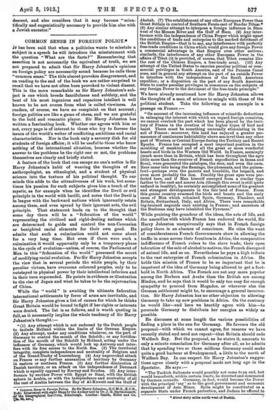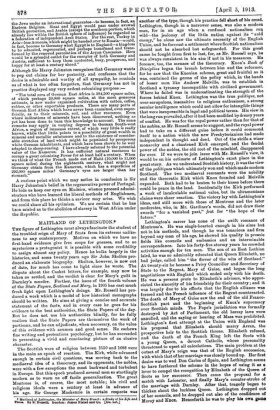subject in a speech he will introduce the misstatement with
the question "What are the facts!'" Remembering that assertion is not necessarily the equivalent of truth, we are not prepared to admit that Sir Harry Johnston's opinions on foreign policy are necessarily sound because he calla them "common sense." The title almost provokes disagreement, and on reading to the end of the book we are rather surprised to recall that we have not often been provoked to violent dissent.
This is the more remarkable as Sir Harry Johnston's sub- ject is one which breeds fancifulness and subtlety, and the bent of his most ingenious and rapacious intellect is well known to be not averse from what is called viewinese. As readers, of course, we have no complaint on that account ; foreign politics are like a game of chess, and we are grateful to the bold and romantic player. Sir Harry Johnston has written a fascinating book. Whether one agrees with him or not, every page is of interest to those who try to foresee the issues of the world's welter of conflicting ambitions and racial characteristics. Nor is the book only a savoury dish for old students of foreign affairs ; it will be useful to those who know nothing of the international situation, because whether the answer to the problems be the right one or not, the problems themselves are clearly and briefly stated.
A feature of the book that can escape no one's notice is Sir Harry Johnston's habit of weaving the thoughts of an anthropologist, an ethnologist, and a student of physical science into the texture of his political thought. To our minds this adds to the attractiveness of his work, but some- times his passion for such subjects gives him a touch of the mystic, as for example when he identifies the Devil or evil principle in the world with bacilli, and notes that the Devil is In league with the backward nations which ignorantly retain among them, and even spread by their ignorant acts, the evil principle. That statement leads on to the thought that some day there will be a "federation of the -world " representing the civilized and right-dealing nations which are determined to guide and control the non-Caucasian or benighted racial elements for their own good. He admits that such a culmination could not come about for a very long time. But even if there were such a culmination it would apparently only be a temporary phase in the cycle of evolution—unless, of course, the Parliament of Man in this "federation of the world" possessed the secret of modifying racial evolution. For Sir Harry Johnston accepts the view that in several periods the white people, by their peculiar virtues, have overcome coloured peoples, only to be outstayed in physical power by their intellectual inferiors and in their turn superseded. He points in evidence or illustration to the rise of Japan and what he takes to be the rejuvenation of China.
While the " world" is awaiting its ultimate federation international settlements by force of arms are inevitable, and Sir Harry Johnston gives a list of causes for which he thinks Great Britain would be bound to fight if her rights or interests were denied. The list is as follows, and is worth quoting in full, as it necessarily implies the whole tendency of Sir Harry Johnston's thought :—
" (1) Any attempt which is not endorsed by the Dutch people to include Holland within the limits of the German Empire. (2) Any attempt, under any conditions whatever, on the part of Germany to control the mouth of the Scheldt; or any fortifica- tion of the mouth of the Scheldt by Holland, acting under the influence of Germany, which would lock up Antwerp and inter- fere with its free access to the North Sea. (3) The territorial integrity, complete independence and neutrality of Belgium and of the Grand-Duchy of Luxemburg. (4) Any unprovoked attack on France or any further annexation of territory by Germany in eastern or northern France. (5) Any further diminution of Danish territory, or an attack on the independence of Denmark which is equally opposed by Norway and Sweden. (6) Any inter- ference by another Power with Egypt. or Sinai, with the British sphere in Arabia, or with the independence and neutrality of all the rest of Arabia between the Bay of Al-Kuweit and the Gulf of • Common Sense in Foreign Policy. By Sir Harry Johnstob, LOH., D.Sc. Illustrated with eight 3Iaps by the Author and by Dr. J. G. Bartholomew, .of the Geographical Institute, Edinburgh. London: Smith, Elder and Co. ed, net.] Akabah. (7) The establishment of any other European Power than Great Britain in control of Southern Persia oast of Bandar Dilain.* (8) Any similar attempt to interpose a foreign influence in Siam west of the Menam River and the Gulf of Siam. (9) Any inter- ference with the independence of China Proper which might upset the conditions of trade and enterprise to the marked detrinient of the British Empire—that is to say, any interference with perfectly free-trade conditions in China which would give any foreign Power a commercial advantage in that Empire over other nations ; similarly, the interference of any other European Power in the affairs of Tibet (it is provided, of course, that Tibet remains like the rest of the Chinese Empire, a free-trade area). (10) Any attempt of the 'United States to exercise peculiar political or com- mercial privileges in South America, east of the Panama Canal zone, and in general any attempt on the part of an outside Power to interfere with the independence of the South American republics ; or a disposition on the part of any South American State to confer peculiar privileges in commerce on the subjects of any foreign Power to the detriment of the free-trade principle."
We have already mentioned bow Sir Harry Johnston allows the thoughts of a man of science to mingle with those of the political student. Take the following as an example in a passage on France :- On account of the increasing influence of scientific deductions in enlarging the interest with which we regard foreign countries, we cannot overlook the part which has been played by the terri- tory of France in tho creation of the higher types of bird and beast. There must be something unusually stimulating in the soil of France : moreover, this land has enjoyed a greater per- manence of continuous habitability above sea-level than any other part of Western or Central Europe during the Tertiary and Recent Epochs. France has occupied a most important position in the moulding of mankind and of all the great or more wonderful beasts and birds in the Western Old World. In France, seemingly (much more than in Britain, which has been throughout the ages little more than the receiver of French superfluities in fauna and flora), were generated the antelopes, the deer, and even the oxen. Here came into being the flamingo, the pheasants, and the guinea- fowl—perhaps even the parrots and hornbills, the leopard, and even more probably the lion. Possibly the great apes were per- fected here, and if Man himself emerged from a similar type farther to the east and nearer Asia (though this event is still quite unfixed in locality), he certainly accomplished some of his greatest and strangest developments in the fair land of France. From this genial country swarmed the birds and beasts and the early races of Man which colonized Spain, Germany, Flanders, and Britain, Switzerland, Italy, and Africa. There were remarkable big-brained negroids once existing in France ; and ancestors of the Bushman may have inhabited the Pyrenees."
While praising the grandeur of the ideas, the arts of life, and the amenifies with which France has endowed the world, Sir Harry Johnston unequivocally says that in French foreign policy there is an absence of conscience. He cites the want of considerateness French Governments show in allowing the
traffic in arms across their frontiers in Africa, the comparative indifference of French rulers to the slave trade, their open toleration of the sale of alcohol to natives, the French disregard of animal life, and so on. Nevertheless he pays a high tribute to the vast enterprise of French colonization in Africa. He holds this mission of France to be so important that he is impatient of the idea of Germany being allowed to get a foot- hold in North Africa. The French are not any more popular among the Berbers and Arabs than the British are among Hindus, and he says that it would be only too easy for enough sympathy to proceed from Mogador, or wherever else the German settlement might be, to encourage a general insurrec- tion. Sir Harry Johnston has no other objection to allowing Germany to take up new positions in Africa. On the contrary he would like—and here we heartily agree with him—to persuade Germany to distribute her energies as widely as possible.
He discusses at some length the various possibilities of finding a place in the sun for Germany. He favours the old proposal—with which we cannot agree, for reasons we have
recently stated and need not repeat—that Britain should cede Walfisch Bay. But the proposal, as he states it, amounts to only a minute consolation for Germany after all, as he admits that by spending two or three millions Germany could make quite a good harbour at Swakopmund, a little to the north of Walfisch Bay. In one respect Sir Harry Johnston's sugges- tions agree closely with a proposal made not long ago in the Spectator. He says :— "The Turkish Sultanate would possibly not come to an end, but would henceforth, within certain limits, be directed and dominated by German councils. Germany, in fact, would become the Power with the principal 'say' as to the good government and economic development of Asia Minor. Syria might be constituted as a separate State under French protection, and Judaea be offered to
• About sixty miles north-west of Bushir.
would be a splendid outlet for the energies of both Germany and















































 Previous page
Previous page